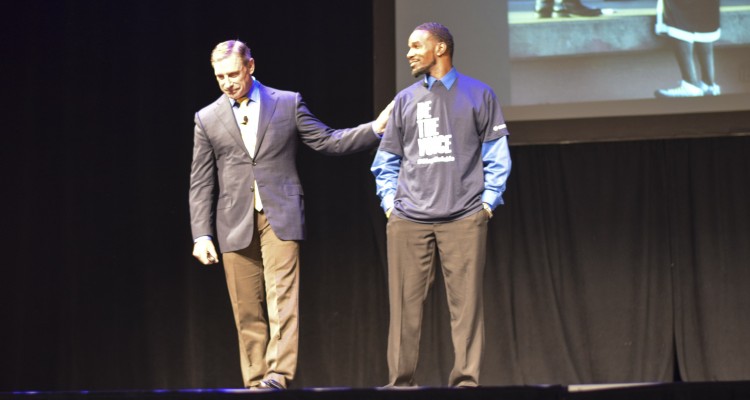Listen to the story below.
Audio Player
By John Ewen
Suicide Prevention Week at the University of Connecticut kicked off on Wednesday with a keynote presentation at the Jorgensen Center.
The presentation, titled “The Bridge Between Suicide & Life,” featured guest speakers Sargent Kevin Briggs and Kevin Berthia. The two discussed their own battles with depression, and advice on how to deal with and help those struggling with mental illness.
“Imagine your life as a book. You’re in the middle of that book right now, and this chapter sucks. It just sucks,” said Briggs. “But you’re not gonna stop in the middle. Read it all the way. It could be fantastic, one of your best books. It’s like your life right now — don’t stop in the middle.”
Briggs is known as the Guardian of the Golden Gate Bridge for his work as a California highway patrol officer where he has helped over 200 people seeking to end their lives find reason to keep living.

The Golden Gate Bridge, where Kevin Berthia nearly committed suicide in 2005. (Image Credit: Rich Niewiroski Jr. / Creative Commons)
Kevin Berthia is among those he saved. Berthia found himself hanging off the edge of the Golden Gate Bridge after facing expensive medical bills for his prematurely born daughter and losing his job in 2004.
“Kevin, you have no job. You’re $225,000 in debt. The day I got that letter is the day I felt like everything else in my life — I was reading in that letter. It felt like every painful moment after that, I felt. Every painful moment I went through in my life, it was present. I was in pain,” said Bethia.
Berthia, who was 22 at the time, said he went months secluding himself from friends and family, until his depression became too much to handle in March of 2005. He climbed over the side of the bridge to jump, but when he heard Briggs’ voice the two stood talking over the Golden Gate strait for over an hour and a half.
“This day, I sat in this position for 92 minutes. 89 minutes, I told a complete stranger, a complete stranger, somebody I knew nothing about, somebody that knew nothing about me,” said Berthia. “My head was down, so it wasn’t about who he was or what he could do for me. It wasn’t about his race, it wasn’t about any of that. It was a compassionate voice at a time of need.”
Berthia and Briggs both stressed the importance of being able to listen as a key to helping anyone dealing with mental illness. After being talked back on to the bridge and receiving treatment, Berthia had difficulty coming to terms with his situation, denying that the man in the picture that grazed the cover of the San Francisco Chronicle was him.
“That’s not me in the picture. The couple of times I got to see it in the newspaper, I always told myself that’s not me in that picture. That’s not me. I never accepted who this was,” he said.
In 2013, Berthia was finally able to accept himself when he presented Briggs an award on behalf of the American Foundation for Suicide Prevention. It was the first meeting between the two since their conversation on the bridge.
Since then, the two have gone on speaking tours together, hoping to raise attention for an issue that, according to Briggs, is constantly overlooked.
“It was really inspiring,” said freshman Katherine Dole, who felt the keynote was great in its ability to reach the crowd. “This whole experience gives me hope because now, not only did I learn that I am doing a lot of the right things, I saw a lot of other people nodding and realizing that they can make a difference.”
As for what the speakers hoped the audience took away, Briggs says letting people in need know they aren’t alone can go a long way.
“I would say be there for them. That way they don’t feel all stuck alone in the corner all by them self,” said Briggs.
As for Berthia, he hopes that his story can get people to see life in a new light.
“I hope that if nothing else, you take away that we have to be human. That we are linked up in this world and that we are really responsible for everybody. It’s not about what you’re going through, it’s about what everybody’s going through,” he said. “If we be human, we’ll understand that it’s other humans going through other things, it’s not about us. So if nothing else, take from it, listen and understand and we are responsible for each other.”


